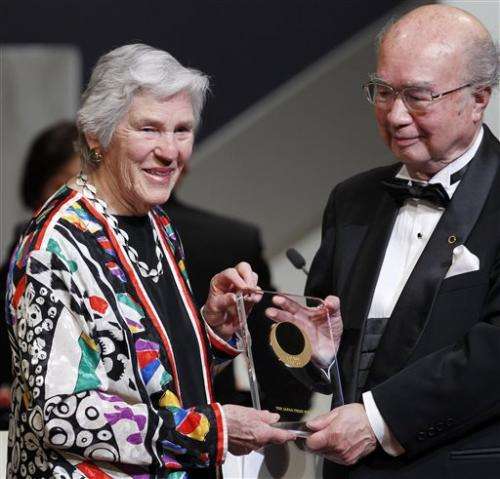In this April 25, 2013, file photo, Dr. Janet Rowley, left, of the University of Chicago, receives a Japan Prize award for the field of "Healthcare and Medical Technology" from Taro Nakayama, chairman of the Board of Councilors of the Japan Prize Foundation, during the award ceremony of the 28th Japan Prize in Tokyo. Rowley, a pioneer in cancer genetics research, died Tuesday, Dec. 17, 2013, of ovarian cancer complications at her home near the University of Chicago, the university said in a statement Wednesday, Dec. 18, 2013. She was 88. (AP Photo/Koji Sasahara, File)
Dr. Janet Rowley, a pioneer in cancer genetics research, has died at age 88.
Rowley spent most of her career at the University of Chicago, where she also obtained her medical degree. She died Tuesday of ovarian cancer complications at her home nearby, the university said in a statement.
Rowley conducted landmark research with leukemia in the 1970s, linking cancer with genetic abnormalities—work that led to targeted drug treatment for leukemia. She identified a genetic process called translocation, now widely accepted. By 1990, more than 70 translocations had been identified in various cancers, according to her biography on the National Library of Medicine's website.
She is a recipient of the National Medal of Science, the highest scientific honor in the U.S. and the Presidential Medal of Freedom, the nation's highest civilian honor.
"Janet Rowley's work established that cancer is a genetic disease," Mary-Claire King, president of the American Society of Human Genetics, said recently. "We are still working from her paradigm."
Rowley, known among colleagues for her intelligence and humility, called receiving the presidential award, in 2009, "quite remarkable."
"I've never regretted being in science and being in research," Rowley said at the time. "The exhilaration that one gets in making new discoveries is beyond description."
With her silvery hair and twinkling eyes, Rowley was a recognizable figure at the University of Chicago, often seen riding her bike around the South Side campus, even up until a few months ago despite her disease. She remained active in research until close to her death and hoped that her own cancer could contribute to understanding of the disease.
Just last month, she was well enough to attend a celebration of the 50th anniversary of the presidential medal in Washington alongside other previous recipients and this year's winners, who include several scientists, former President Bill Clinton, Oprah Winfrey, baseball's Ernie Banks and Loretta Lynn.
Rowley was born in New York City in 1925 and at age 15 won a scholarship to an advanced academic program at the University of Chicago. She went to medical school there when the quota was just three women in a class of 65, the university said.
She often encouraged young researchers to persevere and take risks.
"Success often involves a great deal of luck," Rowley said. "Some people don't like to hear that because it means there are things out of their control. But that's the way it is."
Rowley is survived by three of her four sons and several grandchildren. Her husband of 64 years, Dr. Donald Rowley, died earlier this year. He was a University of Chicago pathology professor who met his future wife in medical school.
© 2013 The Associated Press. All rights reserved.




















